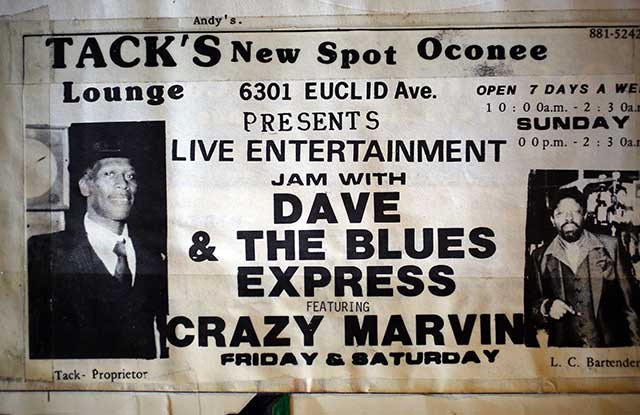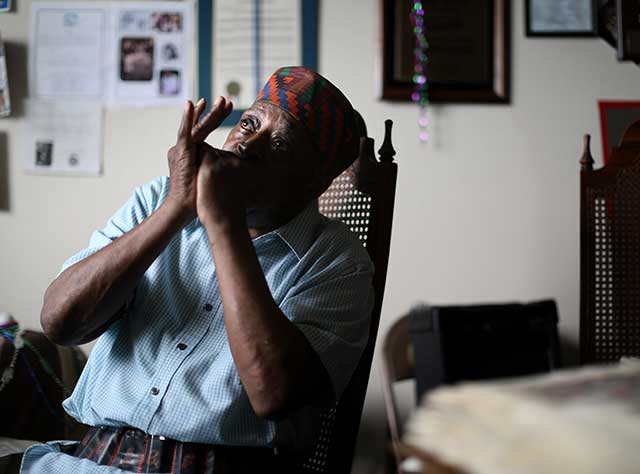I always wondered what might have happened to Fred Davis. I would be reminded of him by the half-inch, reel-to-reel tape recording of his music, of which I always took special care; I believed that music would be his ticket out of Cleveland’s Hough ghetto. When we lost touch, I assumed that nothing like that had happened. When I finally found out what had happened, it was both better, and tragically worse, than I’d imagined.
He was a childhood friend, in a way. We met when I was 19, in the summer before my second year of college. We both made our way, early each morning, through the stinging, low-hanging smog-mist of Cleveland’s industrial Cuyahoga River Valley to the factory, where we unloaded 100-pound sacks from freight cars, piling them onto wood pallets. But our lives up to that point could not have been more different. He was about a decade older, came to work by bus, sent by a day-labor agency, and he had thick, strong arms that reflected time spent in prison. I drove the old Ford my father had bought me; I strained to lift, knowing that if I failed, I’d reflect badly on my dad, given his executive role in the front office.
We learned by chance of our shared enthusiasm for the same music. Southern-born blacks outnumbered “hillbillies” in the shop, so the radio was tuned to either of Cleveland’s two AM R&B stations. It amused both groups, though, when, to pass the time, I’d sing along, as I did one day to “Chains of Love,” Bobby “Blue” Bland’s hit single: “It’s three o’clock in the morning, baby/The moon is shining bright/Sitting here wondering/Where can you be tonight.”
I learned that, before he’d gone to prison in his hometown of Kansas City, Fred had played piano and guitar there professionally—until, he said, he made the innocent mistake of carrying something for someone—drugs, it turned out. It led to several years “in the joint,” as he put it, in the parlance of the 1950s hipster, in which an apartment was a “crib” and a girlfriend an “old lady.”
I saw how well he could play during lunch break one day, when I had brought my guitar to the job. When most of the others went across the street to drink, the two of us sat at a table outside, where he played and sang. You could hear the Kansas City influence the more you listened: the jazz-blues arrangements of Jay McShann (“Confessin’ the Blues”) were there; the complex arrangements of Dinah Washington (“What a Difference a Day Makes”); the harder-edged but still-smooth stylings of Lowell Fulsom or Eddie Boyd (“Five Long Years”). But Davis had a full set of his own originals, too, and he sang them with a piercing, high, tearful voice, from deep, slow blues like “Midnight Is Falling” to more complicated tunes, subtle and swinging, with a hint of T-Bone Walker. “Tell me pretty baby/Tell me so/Am I yours/I’ve got to know/The way you’ve been mistreating me/Got me feeling blue.”
Our relationship evolved to one of teacher and student. He showed me how to play all up and down the guitar, using big, rich chords fingered in an unorthodox way—his thumb wrapped under and up the neck. (I later taught the fingering to my son, who uses it professionally.) He gave stern, uncompromising advice: “Don’t play too loud and don’t play too fast.” Eventually, we’d spend time together after work, at a small house owned by his girlfriend Bertha Reed, a professional test-kitchen cook, in the heart of Cleveland’s East Side ghetto. She appreciated my interest in Fred, I think—but it seemed to me that she had also grown tired and skeptical of his music dreams. He didn’t play much around the house.

At some point, I resolved—idealistically, and perhaps patronizingly—to rescue him. It would be my callow mission to restore him to his career in music. This was 1969, the summer of Woodstock. Civil rights and racial justice were in the air, even after the King assassination. Obscure blues musicians from Mississippi John Hurt to Magic Sam were being “discovered” or “rediscovered” by white enthusiasts and introduced to new audiences. I had a business plan, you might say: to record Fred, backed by an amateur blues band of kids I knew from my suburban high school. I asked a friend who’d moved to Philadelphia to take the tape to the blues agent Dick Waterman, who lived there with his then-girlfriend, a young Bonnie Raitt. Waterman expressed interest. I wrote Fred to let him know, and he wrote back, in a letter filled with an almost desperate hope.
At present, I’m fine, and still working like hell. Man, I do hope something comes of that tape. Just sitting here wishing like hell, but I’m not giving up. . . . I’m still with my old lady. She’s tops. Also, I’m still off the alcohol. . . . Well, cat, I’m going to close for now, but will script you later. You do likewise, and especially if you hear of something from the tape. So until later.
Always a Friend,
Fred Davis
I’d kindled his hope and felt responsibility to follow through. I arranged to meet with Waterman myself in Boston. He was tough and unsentimental but sufficiently sold on Fred’s music to write a letter on his behalf to Baldwin Wallace University near Cleveland, which had booked one of his clients, Mississippi blues singer Fred McDowell. Would they add Fred Davis to the program? “I found his style to be quite good and a very interesting combination of a Kansas City style that also shows some of his earlier (Arkansas) home also,” Waterman wrote. “If you could possibly use him on your program, I’m sure that his pride would be restored and his very fine music would not be abandoned.”
A whole new life, I hoped, would open up for Fred. Having moved on from the factory job, though, I never heard how it turned out, and never heard again from Fred. I always wondered; I feared, in fact, that I’d given him false hope, meddling unnecessarily in his life and perhaps giving the impression that I was more connected and capable than I was. It was a dynamic of which Dick Waterman was clearly aware, as reflected in his letter to Baldwin Wallace. “I have not told (Fred) that I am writing to you because I don’t want him to get his hopes up too high.”
“Two men had robbed Fred in a liquor-store parking lot. When he resisted, one of them shot him.”
It was not until just this year, enabled by a subscription to the Ancestry search service, that I found out what happened. A review of the digital files of the Exponent, Baldwin Wallace’s student newspaper, reveals that the school’s April 10, 1970, folk festival included blues legends Mississippi Fred McDowell and Muddy Waters—but not Fred Davis. Whether they didn’t want to include him, or if he declined for some reason, I can’t say. But the story of Fred’s fate emerges from public records.
An Ohio death certificate, dated November 8, 1988, reveals that Fred Davis, 49, identified as a laborer, had died of a gunshot wound to the chest, with multiple visceral perforations. A Cleveland Plain Dealer story went further. Two men had robbed him of cash in a liquor-store parking lot. When Fred resisted, one of them shot him. Such is the tragedy of talent bleeding out, as it does every day in black America. Davis was that year’s 122nd homicide in Cleveland.
But there was more. Someone had gone to the trouble to write an official newspaper death notice for “Fred (Dave) Davis, son, Oscar and Emma Davis, Kansas City, Missouri, member, the Blues Express Band.” Blues Express! Had he rebuilt his career, after all? Had my encouragement mattered? I could learn the answer to the first question, at least. Blues Express still plays around Cleveland, and I was able to track down its new leader, “Crazy” Marvin Braxton, who had taken over after “Dave” died.
“I was working as a doorman at a hotel downtown,” recalls Marvin, “when they told me, get to St. Vincent’s (charity hospital), Dave’s been shot.” Fred was “good people,” Marvin said, a demanding band leader who always cautioned members not to play—you guessed it—too loud or too fast. With a significant local following, the band played regularly at Fat Fish Blues, for mostly white blues devotees, and at Andy’s Lounge, in the lower-middle-class black Buckeye Road neighborhood. Fred had fans, including a pudgy white suburban couple who never missed a gig. He was planning to renovate a new girlfriend’s house and marry her at the time he was shot. “He didn’t deserve that.”
Why would someone shoot him? Just for the $1,000 he was carrying? How would they have known?
Fred had another side. “Everyone needs a hustle,” Marvin said. Fred, apparently, was selling liquor, illegally, from the back of a car—which he’d buy in bulk from the liquor store that he was going into at the time he was shot. The two cousins who held him up knew about Fred’s business from a sister who was a disappointed girlfriend. “When we went to Dave’s place, we found hair powder she’d put under his pillow. Voodoo.” One of the two robbers—the actual shooter—hanged himself in a Cleveland jail; his accomplice was sentenced to five-to-20 years for manslaughter. Two years later, in 1992, he sought probation, citing his Lima Correctional Institution certificate of achievement for having completed a substance-abuse program, as well as the fact that he had not pulled the trigger. His request was denied.
It’s a tragically familiar story of black-on-black violence; homicide is the leading cause of death for young black men in the United States. The statistics are grim, but they can’t reveal how much talent and how many dreams die each year on Cleveland’s East Side, on Chicago’s South Side, or in other neighborhoods. My friend’s murder was an obscure act of violence, passingly mentioned in a small newspaper story. Yet every day, such obscure acts silence talent and potential like his.

Was the Fred Davis I had known the same guy who sold bootleg liquor from his car? Had he really been set up all those years before in Kansas City? A search for legal records or newspaper stories about his criminal case comes up empty. The only record of Fred’s life in Kansas City is a yearbook photo, circa 1959, from the city’s then-all-black Lincoln High School, where he was a member of a clean-cut, neatly dressed class, many of whom, an alumni association website shows, have gone on to professional accomplishment—as Fred did, in his way. (Located near Eighteenth and Vine, the mecca of Kansas City jazz, Lincoln was the school for college-bound blacks.) Records show he’d come from a two-parent family, one of ten children, born to an Arkansas sharecropper who had moved to Kansas City to work for the railroad. Had he always had a dark side? Perhaps an unjust drug bust had soured him. Perhaps a criminal record kept him from having the sort of day job that other Blues Express members had. Maybe he just couldn’t stand menial work—not when he knew what it felt like to write a great song and sing the way he could.
I still have that tape; it’s been transferred and digitized. I’d love for the Lincoln High School alumni association—or anyone else in Kansas City or Cleveland—to recognize him and for his music to be played again. I admit it: I’m still trying to save Fred Davis.
Contributions in Fred Davis’s memory may be made to the R. T. Coles/Lincoln High School Association, to support college scholarships for current Lincoln High students.
Top Photo: Fred “Dave” Davis (far right) with band during the 1980s (LISA DEJONG)






